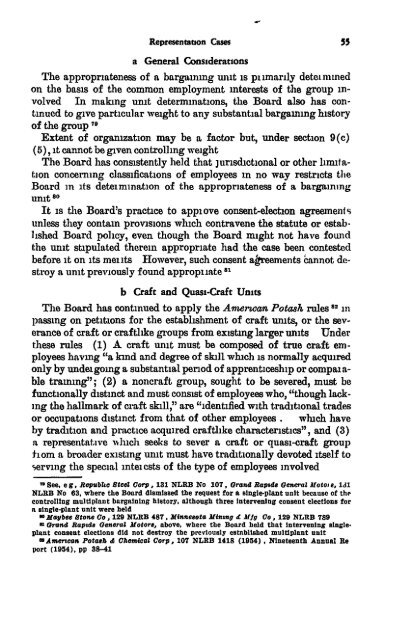TWENTY-SIXTH ANNUAL REPORT - National Labor Relations Board
TWENTY-SIXTH ANNUAL REPORT - National Labor Relations Board
TWENTY-SIXTH ANNUAL REPORT - National Labor Relations Board
Create successful ePaper yourself
Turn your PDF publications into a flip-book with our unique Google optimized e-Paper software.
Representation Cases 55<br />
a General Considerations<br />
The appropriateness of a bargaining unit is pi 'manly detei mined<br />
on the basis of the common employment interests of the group involved<br />
In making unit determinations, the <strong>Board</strong> also has continued<br />
to give particular weight to any substantial bargaining history<br />
of the group"<br />
Extent of organization may be a factor but, under section 9(c)<br />
(5), it cannot be given controlling weight<br />
The <strong>Board</strong> has consistently held that jurisdictional or other limitation<br />
concerning classifications of employees in no way restricts the<br />
<strong>Board</strong> m its deteimination of the appropriateness of a bargaining<br />
unit 80<br />
It is the <strong>Board</strong>'s practice to appiove consent-election agreement s<br />
unless they contain provisions which contravene the statute or established<br />
<strong>Board</strong> policy, even though the <strong>Board</strong> might not have found<br />
the unit stipulated therein appropriate had the case been contested<br />
before it on its ments However, such consent agreements Cannot destroy<br />
a unit previously found appropnate 81<br />
b Craft and Quasi-Craft Units<br />
The <strong>Board</strong> has continued to apply the American Potash rules 82 in<br />
passing on petitions for the establishment of craft units, or the severance<br />
of craft or craftlike groups from existing larger units Under<br />
these rules (1) A craft unit must be composed of true craft employees<br />
having "a kind and degree of skill which is normally acquired<br />
only by undei going a substantial period of apprenticeship or compai a-<br />
ble training"; (2) a noncraft group, sought to be severed, must be<br />
functionally distinct and must consist of employees who, "though lacking<br />
the hallmark of craft skill," are "identified with traditional trades<br />
or occupations distinct from that of other employees, which have<br />
by tradition and practice acquired craftlike characteristics", and (3)<br />
a representative mhich seeks to sever a craft or quasi-craft group<br />
horn a broader existing unit must have traditionally devoted itself to<br />
serving the special intei ests of the type of employees involved<br />
T° See, e g , Republic Steel Corp • 131 NLRB No 107 , Grand Rapids General Moto' s, 131<br />
NLRB No 63, where the <strong>Board</strong> dismissed the request for a single-plant unit because of the<br />
controlling multiplant bargaining history, although three intervening consent elections for<br />
a single-plant unit were held<br />
80 Maybes Stone Co , 129 NLRB 487 • Minnesota Minsng d Mfg Co. 129 NLRB 789<br />
al Grand Rapids General Motors, above, where the <strong>Board</strong> held that intervening singleplant<br />
consent elections did not destroy the previously established multiplant unit<br />
as American Potash ti Chemical Corp, 107 NLRB 1418 (1954) • Nineteenth Annual Re<br />
port (1954), pp 38-41

















